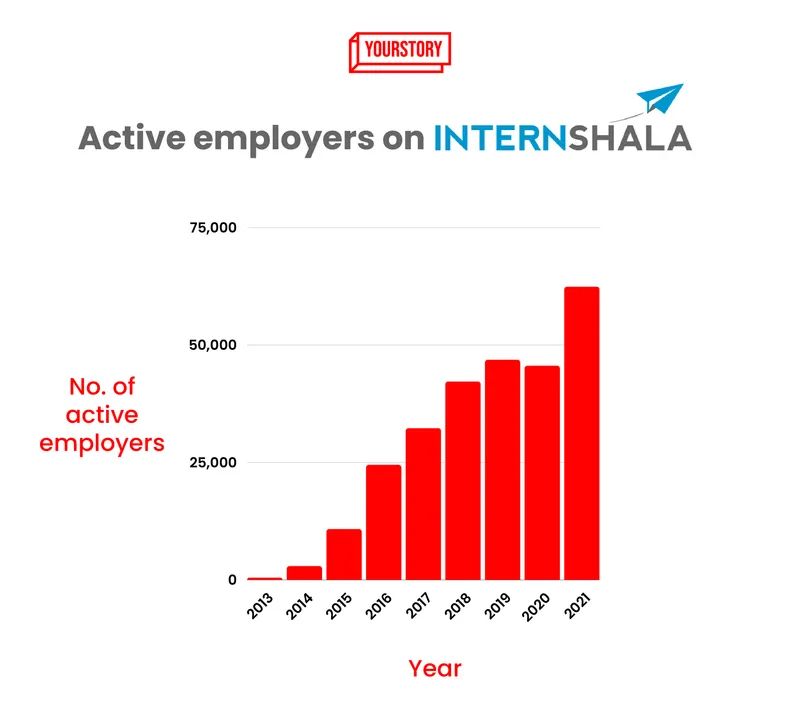Internshala’s journey from a blog to a profitable internship and skilling platform
In 2010, Internshala started as a blog. Today, it is one of India’s leading internship portals, with services like skill training and a job listing forum.
When Sarvesh Agrawal launched a blog to help students spruce up their resumes and make themselves more hireable, little did he know how much his life would change.
It was 2010, and the blog was just a side hustle. Having been a part of campus recruitment teams in the past, Sarvesh was familiar with mistakes students often made during the recruitment process, including in their resumes and interviews.
Gradually, this began to include advice for students seeking internship opportunities as well. “That (internship) is the first formal interaction you have with the real world,” he tells YourStory.
But soon, it was clear that the real opportunity lay in building a platform that could help students access, apply, and avail of internships.
Thus, was born.
Cut to the present and there are about 2.2 million active students applying for internships posted by more than 60,000 brands. In FY21, the startup recorded revenue of Rs 20 crore, up 89 percent from the previous fiscal.
In fact, today, the Gurugram-based startup is aiming to be an end-to-end career tech platform for students and freshers, offering training courses, job listings, and more.
How did it get here?

Design: Yash Saxena
Solving the chicken-egg problem
Back when it started, internships in India were an unregulated market and internships themselves weren’t as popular as it is today.
Moreover, starting up was a chicken and egg problem. Students wouldn’t visit the site without internships and companies wouldn’t post internship opportunities without a robust audience.
Sarvesh, an alumnus of IIT Madras, decided to take a leaf out of Sanjeev Bikhchandani’s book. The Naukri.com founder had started by posting job advertisements from newspapers on the website to build traffic.
He began looking up internship opportunities and posted them on his blog, which helped him get some traffic.
The real start happened after the IIT Madras alumni cell invited him to speak about the idea of Internshala with the community, which included many people who were a part of corporate and educational communities around the world.
Then, an email from the alumni association to its members further spread the word. Internshala started garnering interest and in February 2011, the platform received its first organic listing from a startup incubated at IIT Kanpur.
It is actually startups that have made internships more mainstream.
Anjali Raghuvanshi, Chief People Officer, Randstad India, attributes this to the changing needs of the market. “People can see the skill gap in the market and hence, the need to skill more people.”
For companies, getting interns is beneficial over hiring freshers for full-time roles. It helps them assess how students fit into the culture, train or upskill them, and make them workforce ready, she adds.
Manu Saigal, Director - General Staffing at Adecco India, says internships are a win-win situation for both job-seekers and employers as it lowers the costs for recruiting and training for companies as these youngsters will be joining with some pre-training, and also gives students a chance to learn on-the-job.
Growing up
Even with organic listings, Internshala was a modest operation. For two years, it remained a personal project. Sarvesh himself would hire interns through his platform to manage the growing requests and traffic.
However, the need to automate certain tasks arose, which could not be done via a blog hosted elsewhere. He needed his own website.
In 2013, he got an office space, built a small team, and finally launched Internshala’s website. As more companies began discovering the platform, scaling up was easy. But there were other challenges.
“I struggled a lot with technology,” says Sarvesh. “Technology is important, which is obvious now but wasn’t then.”
Slowly, he managed to build a robust technology team and in 2015, Internshala launched its Android app, which took only three months to build.
The startup has come a long way since then. Last year alone, more than 300,000 students secured internships via the platform with an average stipend of Rs 6,655 per month.
One of the main drivers is the need to reach Tier II and beyond to create a diverse workforce and internships are crucial in connecting students with the corporate world.
“It helps in bridging the gap between theory and practice while focussing on skill building for everyone,” Manu says.
Branching out
The first monetisation opportunity for Internshala was purely organic—an IBM executive, who had received the email shared with the IIT Madras alumni network, decided to advertise a career education programme by IBM on the platform.
Thus, advertising became the key way to generate revenue for the startup.
But ad monetisation was difficult to scale; it meant Internshala was competing with the likes of Facebook and Google for ad revenue share.
In 2016, the startup decided to launch Internshala Trainings after seeing many students on the platform did not have the required skills for an internship.
Most would enrol themselves at offline training centres by big corporations. However, students who were not based in metro cities did not have this access and Internshala saw it as an opportunity. Then, some applicants may want to expand their skill set.
“While metros continue to offer ample opportunities to students, there is still a void of internship platforms in the rest of the country,” says Adecco India’s Manu.
And so, Internshala decided to build an online platform where students could learn the skills in demand. When the first course went live, over 550 students registered—far more than what the team had expected.
“That opened our eyes that maybe if we have more programmes, improve their quality through marketing, this can become a channel for us to sustain and grow,” Sarvesh says.
And it has.
Swastik Chaturvedi, a 24-year-old CA aspirant from Mathura, Uttar Pradesh, completed a six-week online module on Financial Modelling and Valuation—his second Internshala course—last week.
Speaking to YourStory on why this will help his job search, he simply says, “Internshala has a brand image.”
And he is not alone. Since 2016, Internshala has seen more than 4.3 lakh students take these courses that cost Rs 1,300-1,500 and can last anywhere between four and eight weeks.
In 2021 alone, about 1.3 lakh students took an Internshala course.
Each of the 65 available courses is designed by internal and external experts. They are conducted in cohorts using videos, quizzes, peer grading, and assignments.
Today, skill training accounts for about 65 percent of the startup’s revenue. As a result, it has been able to retire the ad model gradually over the years.

A full-stack career tech company
The startup then set out to be a part of students’ entire journey—from Day 1 at college to Day 1 at their job—by becoming a full-stack career-tech company that helped build careers from scratch.
“Every college student’s dream is to have a great first job, a great offer in hand, and the skills and confidence to succeed at that,” Sarvesh says. “That has become our goal.”
With internships and upskilling in place, Internshala’s next step was to build a placement engine.
In 2020, Internshala launched a forum for companies to list entry-level or freshers’ jobs, which seemed like a natural progression for its users—both students and companies.
However, this time, the startup decided to monetise the listings. For the first time, companies need to pay Rs 5,000 to list a job on Internshala
“We didn’t know how many of them wouldn't pay,” recalls Sarvesh. But the team was surprised to see positive feedback and response.
Reassured, Internshala launched a freemium offering for its internship listings in 2021. For about Rs 3,000 per listing or an annual subscription of Rs 90,000, companies could now get guaranteed interns—with a moneyback offer in place in case it doesn’t—and have more visibility, quicker hiring, and advanced features on the listing like AI-recommend profiles, dedicated relationship manager, and application tracking tools.
This freemium offering now makes up about 25 percent of Internshala’s revenue.
The remaining is through an outcome-based offering launched earlier this year, which offers specialised training and guaranteed internships in a select few courses—such as digital marketing and human resource management—for a fee of about Rs 20,000-30,000 per student.

Funding and future
Internshala raised its first round in 2012—about $25,000. In 2015, it raised another $2.5 million in Series A funding, according to data from Tracxn Technologies.
This May, it raised an undisclosed round and aims to use the capital to scale the business and commercialise the growth.
“We have been breaking even every year,” says Sarvesh, adding that the extra revenue is invested back into the startup’s growth.
As the workforce develops and demands more skilled workers, internships are only going to rise. While “progressive organisations are willing to invest the time and money to build connections between academia and the industry, it’s still a far-fetched dream,” says Adecco India’s Manu.
That’s where these internship platforms will help in future as demand for the workforce increases.
According to Anjali of Randstad India, job seekers have a better chance of getting hired with more work experience. She adds that internships also help companies tackle the skill gap between academia and industry.
Today, while the likes of LetsIntern, Interns World, LinkedIn, Naukri, and others offer internship listings as well, it is clear that Internshala is the go-to platform for most.
Aside from the early-mover advantage, the startup boasts of a relationship “based on trust” with its users.
It authenticates new employers posting an internship or job opportunity and has a dedicated team to manually review every listing before it goes live on the platform.
In fact, Internshala has seen its student users—who landed successful internships via the platform—come back as recruiters later.
“One example is Rajvardhan Agarwal. He used Internshala both as a student and later as a recruiter when he was building Archmozzo, a marketplace for architects and construction material manufacturers. Now, he is an employee of Internshala,” says Sarvesh.
The startup itself has a team of 203 members, of which 22 percent are interns.
“Out of our current permanent employees, 42 percent joined Internshala as interns and then converted to full-time team members. Which is why we say, Internshala is of the interns, for the interns, and by the interns,” he signs off.
(This story is updated to add new graphics.)
Edited by Saheli Sen Gupta










